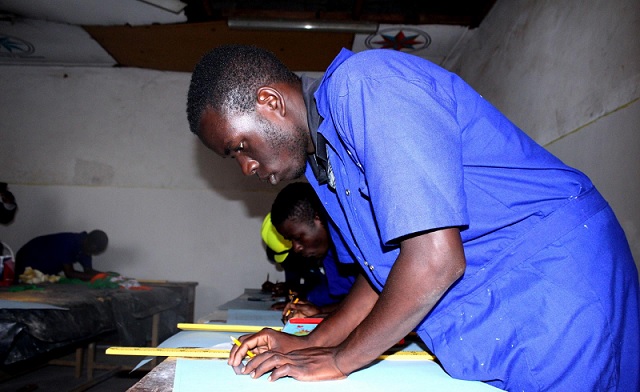
Tororo, Uganda | THE INDEPENDENT | Justus Balyanyuka’s journey toward higher education was painted with dreams of opportunities when he secured a coveted government scholarship to study at Uganda Cooperative College in Tororo. But the reality, hidden beneath the glossy surface of this scholarship, left him disheartened and questioning the true essence of what it means to be a government-sponsored student.
Balyanyuka, hailing from a modest family in Rukungiri district, was among the fortunate students selected for government Technical and Vocational Education and Training (TVET) scholarships this year based on their academic excellence. In his excitement, he presumed that this scholarship, like those for university students, would lift the financial burden off his shoulders.
However, the stark truth shattered his dreams. “I couldn’t believe it when I saw my name on the list. A diploma program in accounting and finance was within reach. My grades had earned me private scholarships at various universities, but finances were always a barrier,” laments Balyanyuka.
But here’s the catch – according to the admission letter our reporter examined, Balyanyuka is expected to pay a “functional fee” of Shillings 743,000 before he can begin his studies. The fine print further states, “You must report with a paid-up bank slip. No refund will be made to a student who withdraws from the program after two weeks from the date of opening the semester.”
In essence, students must pay up or risk losing their coveted spots to those on the waiting list. Balyanyuka’s initial enthusiasm gave way to disappointment upon encountering the financial obstacle. In addition to the functional fees, there exists an extensive list of other necessary requirements.
Musa Musoke, a concerned parent whose child also secured a TVET scholarship, echoes similar sentiments. He notes that, in some cases, the fees required are exorbitant.
“Why should I send my child all the way to Tororo to pursue a diploma in accounting and be asked to pay nearly 800,000 as functional fees? That amount is already sufficient to enroll him for the same course right here in Kampala,” Musoke exclaims.
Mark Kalanzi, the principal of Hoima School of Nursing and Midwifery, adds his voice to the growing chorus of concerns. He questions whether the term “TVET scholarship” accurately reflects the level of support provided.
“Government assistance consistently falls short of expectations. TVET scholarships should be on par with those offered at universities. In universities, the government covers students’ expenses for food, accommodation, full tuition, and other associated benefits. Unfortunately, this level of support is not extended here, and it’s understandable when parents express that this does not truly resemble a scholarship,” Kalanzi argues.
Isaac Biryomumaisho, the guild president of the Butabika School of Psychiatric Nursing, has raised similar concerns. Based on his previous experiences, he emphasized that the government sponsors 20 students at their school, yet some of them do not enroll. Biryomumaisho says last year, ten students didn’t attend because parents were deterred by the high fees and charges associated with a so-called scholarship.
“This should be referred to by a different name; it shouldn’t be labeled as a scholarship. The tuition fees are exorbitant, and often parents enroll their children without fully understanding the financial burden it entails. Some students end up dropping out, and other parents resort to taking out loans or selling assets to ensure their child completes their education,” says Biryomumaisho.
When asked about this matter, officials from both the Ministry of Education’s administration and the TVET departments chose not to provide a response. John Chrysostom Muyingo, the State Minister responsible for higher education, also found himself unable to offer an explanation for the current structure of TVET scholarships.
However, he acknowledged that this question has been raised on numerous occasions in the past. Muyingo elaborated that the government is actively developing regulations for fees and charges in schools. According to him, these regulations will also play a pivotal role in reshaping the structure of TVET fees and scholarships, hopefully resolving the hidden costs conundrum.
TVET education, once plagued by negative stereotypes, has gained appreciation from parents as more students opt for TVET programs. However, financial constraints continue to hamper the aspirations of many, as TVET courses tend to be expensive.
In a bid to promote TVET, impart crucial skills, and combat unemployment, the NRM government in their 2020 manifesto pledged universal TVET education, ensuring that any qualified Ugandan could enroll without tuition fees. However, this promise remains unfulfilled, casting doubts on the true nature of these scholarships.
Through the Joint Admissions Board, the government sponsors 6,000 students for diplomas in different TVET institutions. This year, more scholarships were introduced. These scholarships aim to provide accessible education, especially to girls and persons with disabilities (PWDs).
However, it turns out that behind the glossy veneer of TVET scholarships lies a hidden truth – the burden of fees that threaten to shatter dreams. As students and parents demand transparency and equity, the future of TVET education in Uganda remains uncertain. Will it truly become the beacon of opportunity it aspires to be, or will it remain a scholarship in disguise?
*****
URN
 The Independent Uganda: You get the Truth we Pay the Price
The Independent Uganda: You get the Truth we Pay the Price



